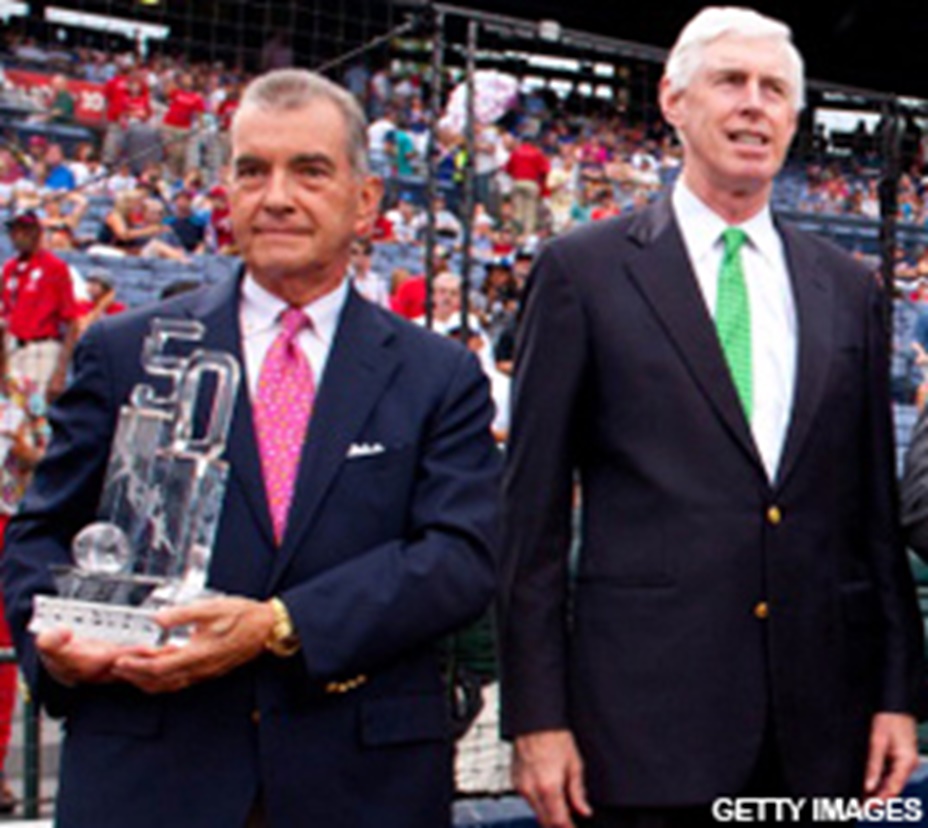The Braves' plans for their proposed $672M stadium complex in Cobb County (Ga.) "came into clearer view Friday," according to Bluestein & Hart of the ATLANTA JOURNAL-CONSTITUTION. The plans "feature golf-cart-like trains like Disney’s circulating through the area, a soaring pedestrian bridge over I-285 to carry them, and a grand walkway flanked by new local shops and restaurants." How to "get people from their homes to the stadium gate remains one of the biggest problems with the proposed location" (ATLANTA JOURNAL-CONSTITUTION, 11/16).
SOUND OF SILENCE: In Atlanta, Tim Tucker reported moves of "such magnitude" as the Braves' plan to leave Turner Field for Cobb County "usually originate with the owner, but in the unusual case of the Braves ... six of the team’s front-office executives quietly drove what is perhaps the biggest decision in the franchise’s 47 years" in the city. The six officials: Braves Chair & CEO Terry McGuirk, team President John Schuerholz, Exec VP/Business Operations Mike Plant, Exec VP/Sales & Marketing Derek Schiller, Senior VP & General Counsel Greg Heller and CFO Chip Moore, "described a collaborative and consuming process." The execs months ago "agreed to a code of silence about what they were up to," and they "required the same from anyone they had to bring into the process as a deal moved closer to completion with Cobb." Schuerholz acknowledged "some people are dismayed" by the secrecy of the Braves' efforts. But he said it was the "only way we could go about this ... because of the timing and the impact on our relationship and partnership with the city and our about-to-be-new partnership with Cobb County." The six execs said that they "began to focus in the fall of 2011 on what would happen when the Turner Field lease expires" after the '16 season. Plant on July 3 had a three-hour introductory lunch with Cobb County Commission Chair Tim Lee, and about four weeks later, Lee "showed Plant 60 acres of undeveloped land near the intersection of Interstates 75 and 285." The Braves execs in late August "made the trip to Englewood, Colo., to present the financial plan" for a new ballpark to team Owner Liberty Media execs, who "gave preliminary approval." Talks then "intensified with Cobb" (ATLANTA JOURNAL-CONSTITUTION, 11/17).
TURF WAR: In Atlanta, J. Scott Trubey wrote the Braves' decision to relocate outside of the city of Atlanta is a "direct hit, a seismic victory in the eternal conflict" between the city and its nearby suburbs. It "began to feel last week" as if the nearby counties "might be gaining the upper hand" on the city. Atlanta’s center of gravity for decades has "shifted away from Atlanta’s center, moving inexorably northward ... and dragging with it development, money, political power and, increasingly, cultural cachet." Now, it is "dragging away the Braves" too (ATLANTA JOURNAL-CONSTITUTION, 11/16). Also in Atlanta, Edwards & McCaffrey reported in the weeks "leading up to the blockbuster announcement that the Braves will relocate to Cobb County, investors quietly snapped up key properties around the new ballpark site." Tens of millions of dollars have "changed hands since June in deals involving hotels, vacant land and office buildings." The "rash of purchases raises questions about who knew what and when, suggesting buyers of nearby land were either incredibly lucky or incredibly connected" (ATLANTA JOURNAL-CONSTITUTION, 11/16).
SIGN OF THE TIMES? In N.Y., Kim Severson wrote the Braves' planned move has started a "regional civic conversation," about whether the move will be a "blow to a city beginning to enjoy a post-recession urban renaissance, or is it a signal of a new era in which traditional assumptions about the divide between city and suburb no long apply?" Many in Atlanta argued that the move "is a blow," especially because ballparks are "being used to revitalize the urban cores of cities like Denver and Minneapolis." Turner Field "has never really served as an engine of revitalization, although civic leaders have tried." The surrounding neighborhoods of Turner Field "have some newer lofts and houses but also some of the poorest households in the city." The ballpark is "without a stop on Atlanta’s chronically underfunded Marta train system," and there "is not even a bank or a grocery store nearby" (N.Y. TIMES, 11/17). The AP's Paul Newberry wrote under the header, "Atlanta Stadium Deals A Warning To Others." The Braves' move and the Falcons' planned move to a new stadium are "about shameful waste," as two "perfectly useful stadiums are going to be reduced to rubble" (AP, 11/16).
UP CLOSE & PERSONAL: SPORTSBUSINESS JOURNAL's Don Muret notes the proposed ballpark's 41,500 seats "represent 8,000 fewer than at Turner Field." The Braves' intent is to "develop a smaller footprint with more intimate views and unique spaces." The planned 30 to 40 suites "place it among the MLB parks with the fewest skyboxes." Turner Field opened in '97 "with 63 suites." Ten percent of the new park’s total seats "will be in premium locations, many tied to clubs and all-inclusive food and drink packages" (SPORTSBUSINESS JOURNAL, 11/18 issue).




